Corporate Law: Black Economy Task Force and Phoenixing Analysis
VerifiedAdded on 2022/11/28
|11
|2880
|214
Report
AI Summary
This report delves into the concepts of the black economy and phoenixing in the Australian context, drawing upon the Black Economy Task Force Final Report and related legal frameworks. It defines the black economy as activities aimed at avoiding tax obligations and discusses various practices involved, including cash payments, unreported savings, and money laundering. The report then explores illegal phoenix activity, where companies are dissolved and assets transferred to new entities to evade debts, highlighting its detrimental effects on creditors, employees, and revenue authorities. It examines the legal and illegal aspects of phoenixing, the economic impacts, and the role of directors in such activities. The report analyzes existing laws, including directors' duties, and proposes a new approach focusing on strengthening enforcement of these duties to combat illegal phoenix activity, rather than creating new prohibitions. The report also discusses early warning signs of phoenixing, such as financial difficulties, name changes, asset sales, and the use of similar business operations. It emphasizes that phoenixing is considered illegal because it breaches the interests of creditors.
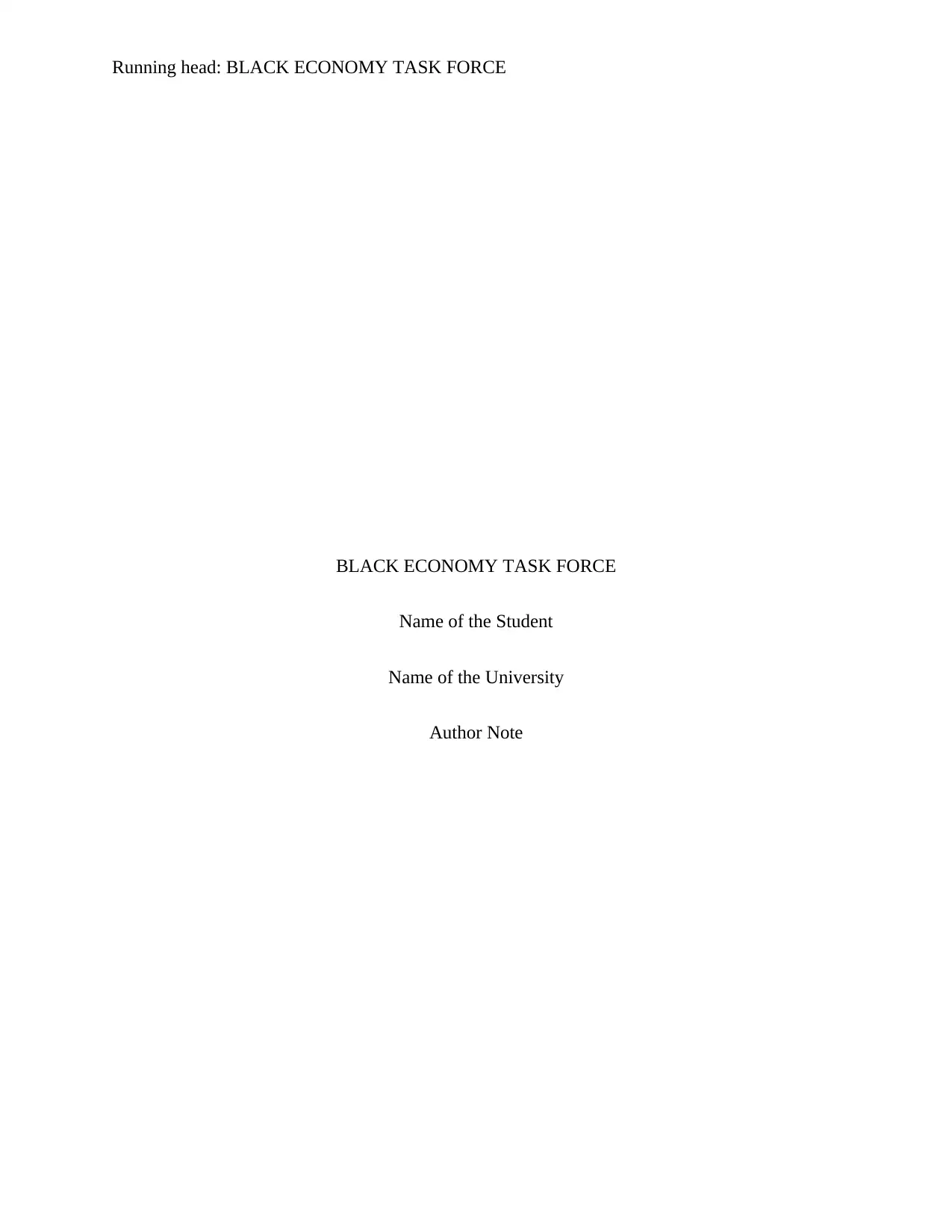
Running head: BLACK ECONOMY TASK FORCE
BLACK ECONOMY TASK FORCE
Name of the Student
Name of the University
Author Note
BLACK ECONOMY TASK FORCE
Name of the Student
Name of the University
Author Note
Paraphrase This Document
Need a fresh take? Get an instant paraphrase of this document with our AI Paraphraser
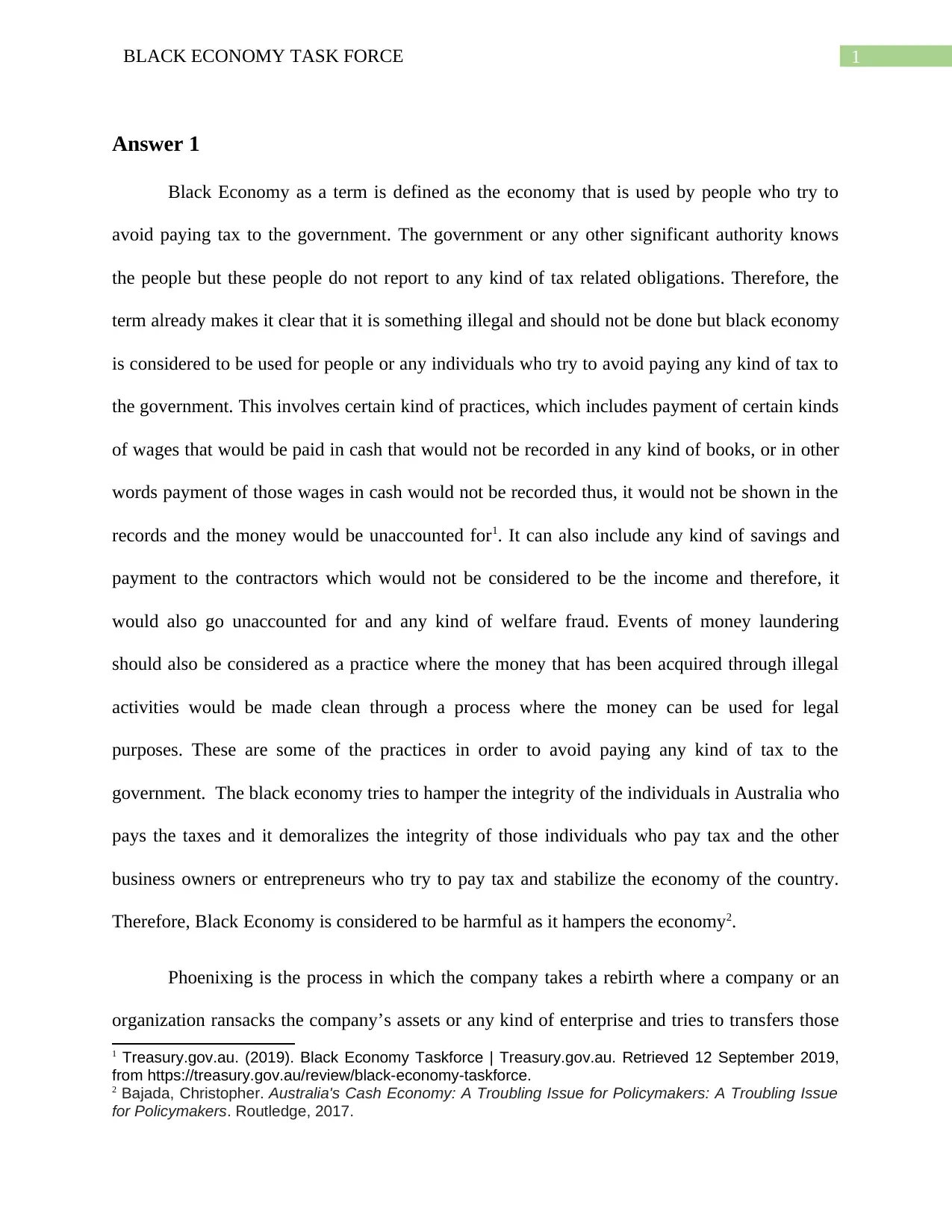
1BLACK ECONOMY TASK FORCE
Answer 1
Black Economy as a term is defined as the economy that is used by people who try to
avoid paying tax to the government. The government or any other significant authority knows
the people but these people do not report to any kind of tax related obligations. Therefore, the
term already makes it clear that it is something illegal and should not be done but black economy
is considered to be used for people or any individuals who try to avoid paying any kind of tax to
the government. This involves certain kind of practices, which includes payment of certain kinds
of wages that would be paid in cash that would not be recorded in any kind of books, or in other
words payment of those wages in cash would not be recorded thus, it would not be shown in the
records and the money would be unaccounted for1. It can also include any kind of savings and
payment to the contractors which would not be considered to be the income and therefore, it
would also go unaccounted for and any kind of welfare fraud. Events of money laundering
should also be considered as a practice where the money that has been acquired through illegal
activities would be made clean through a process where the money can be used for legal
purposes. These are some of the practices in order to avoid paying any kind of tax to the
government. The black economy tries to hamper the integrity of the individuals in Australia who
pays the taxes and it demoralizes the integrity of those individuals who pay tax and the other
business owners or entrepreneurs who try to pay tax and stabilize the economy of the country.
Therefore, Black Economy is considered to be harmful as it hampers the economy2.
Phoenixing is the process in which the company takes a rebirth where a company or an
organization ransacks the company’s assets or any kind of enterprise and tries to transfers those
1 Treasury.gov.au. (2019). Black Economy Taskforce | Treasury.gov.au. Retrieved 12 September 2019,
from https://treasury.gov.au/review/black-economy-taskforce.
2 Bajada, Christopher. Australia's Cash Economy: A Troubling Issue for Policymakers: A Troubling Issue
for Policymakers. Routledge, 2017.
Answer 1
Black Economy as a term is defined as the economy that is used by people who try to
avoid paying tax to the government. The government or any other significant authority knows
the people but these people do not report to any kind of tax related obligations. Therefore, the
term already makes it clear that it is something illegal and should not be done but black economy
is considered to be used for people or any individuals who try to avoid paying any kind of tax to
the government. This involves certain kind of practices, which includes payment of certain kinds
of wages that would be paid in cash that would not be recorded in any kind of books, or in other
words payment of those wages in cash would not be recorded thus, it would not be shown in the
records and the money would be unaccounted for1. It can also include any kind of savings and
payment to the contractors which would not be considered to be the income and therefore, it
would also go unaccounted for and any kind of welfare fraud. Events of money laundering
should also be considered as a practice where the money that has been acquired through illegal
activities would be made clean through a process where the money can be used for legal
purposes. These are some of the practices in order to avoid paying any kind of tax to the
government. The black economy tries to hamper the integrity of the individuals in Australia who
pays the taxes and it demoralizes the integrity of those individuals who pay tax and the other
business owners or entrepreneurs who try to pay tax and stabilize the economy of the country.
Therefore, Black Economy is considered to be harmful as it hampers the economy2.
Phoenixing is the process in which the company takes a rebirth where a company or an
organization ransacks the company’s assets or any kind of enterprise and tries to transfers those
1 Treasury.gov.au. (2019). Black Economy Taskforce | Treasury.gov.au. Retrieved 12 September 2019,
from https://treasury.gov.au/review/black-economy-taskforce.
2 Bajada, Christopher. Australia's Cash Economy: A Troubling Issue for Policymakers: A Troubling Issue
for Policymakers. Routledge, 2017.
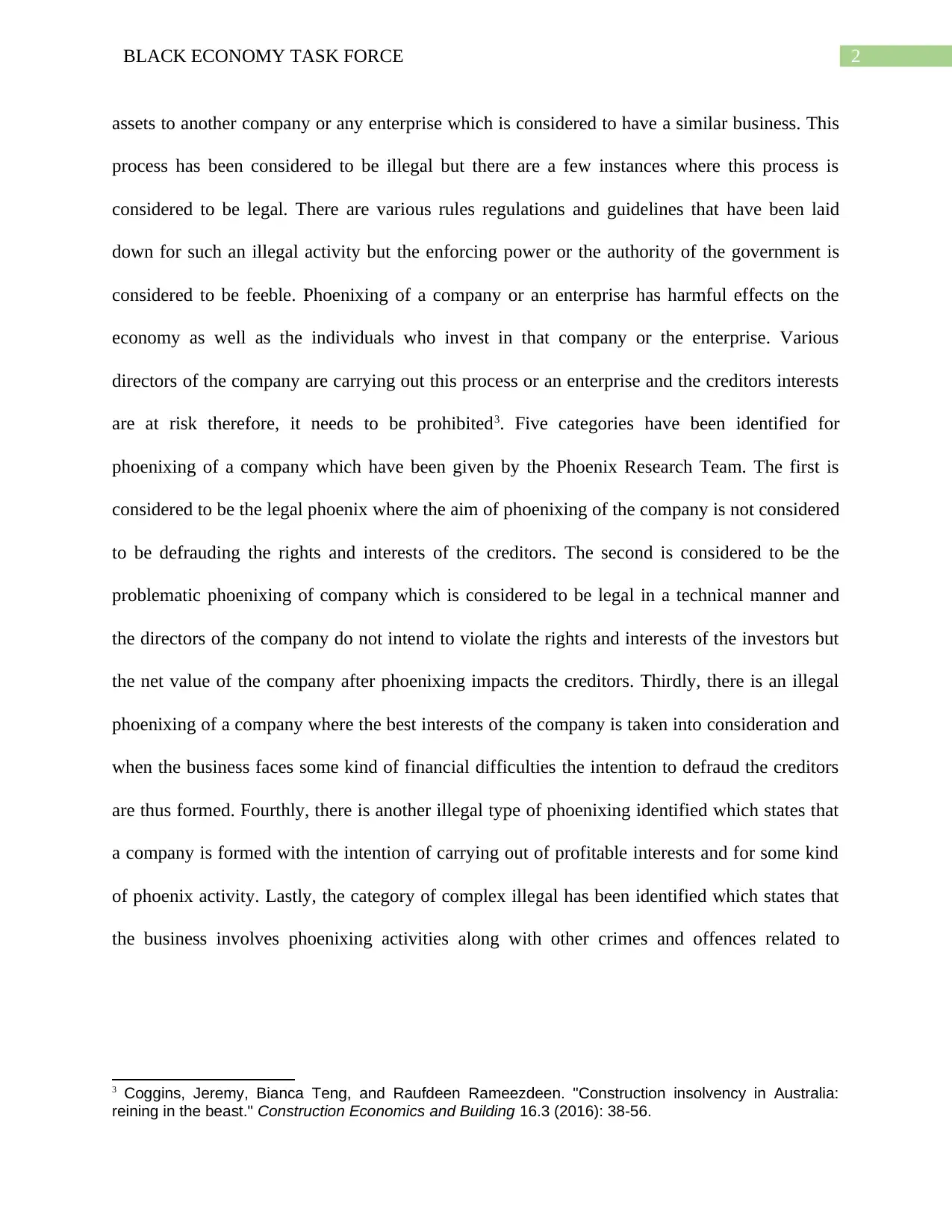
2BLACK ECONOMY TASK FORCE
assets to another company or any enterprise which is considered to have a similar business. This
process has been considered to be illegal but there are a few instances where this process is
considered to be legal. There are various rules regulations and guidelines that have been laid
down for such an illegal activity but the enforcing power or the authority of the government is
considered to be feeble. Phoenixing of a company or an enterprise has harmful effects on the
economy as well as the individuals who invest in that company or the enterprise. Various
directors of the company are carrying out this process or an enterprise and the creditors interests
are at risk therefore, it needs to be prohibited3. Five categories have been identified for
phoenixing of a company which have been given by the Phoenix Research Team. The first is
considered to be the legal phoenix where the aim of phoenixing of the company is not considered
to be defrauding the rights and interests of the creditors. The second is considered to be the
problematic phoenixing of company which is considered to be legal in a technical manner and
the directors of the company do not intend to violate the rights and interests of the investors but
the net value of the company after phoenixing impacts the creditors. Thirdly, there is an illegal
phoenixing of a company where the best interests of the company is taken into consideration and
when the business faces some kind of financial difficulties the intention to defraud the creditors
are thus formed. Fourthly, there is another illegal type of phoenixing identified which states that
a company is formed with the intention of carrying out of profitable interests and for some kind
of phoenix activity. Lastly, the category of complex illegal has been identified which states that
the business involves phoenixing activities along with other crimes and offences related to
3 Coggins, Jeremy, Bianca Teng, and Raufdeen Rameezdeen. "Construction insolvency in Australia:
reining in the beast." Construction Economics and Building 16.3 (2016): 38-56.
assets to another company or any enterprise which is considered to have a similar business. This
process has been considered to be illegal but there are a few instances where this process is
considered to be legal. There are various rules regulations and guidelines that have been laid
down for such an illegal activity but the enforcing power or the authority of the government is
considered to be feeble. Phoenixing of a company or an enterprise has harmful effects on the
economy as well as the individuals who invest in that company or the enterprise. Various
directors of the company are carrying out this process or an enterprise and the creditors interests
are at risk therefore, it needs to be prohibited3. Five categories have been identified for
phoenixing of a company which have been given by the Phoenix Research Team. The first is
considered to be the legal phoenix where the aim of phoenixing of the company is not considered
to be defrauding the rights and interests of the creditors. The second is considered to be the
problematic phoenixing of company which is considered to be legal in a technical manner and
the directors of the company do not intend to violate the rights and interests of the investors but
the net value of the company after phoenixing impacts the creditors. Thirdly, there is an illegal
phoenixing of a company where the best interests of the company is taken into consideration and
when the business faces some kind of financial difficulties the intention to defraud the creditors
are thus formed. Fourthly, there is another illegal type of phoenixing identified which states that
a company is formed with the intention of carrying out of profitable interests and for some kind
of phoenix activity. Lastly, the category of complex illegal has been identified which states that
the business involves phoenixing activities along with other crimes and offences related to
3 Coggins, Jeremy, Bianca Teng, and Raufdeen Rameezdeen. "Construction insolvency in Australia:
reining in the beast." Construction Economics and Building 16.3 (2016): 38-56.
⊘ This is a preview!⊘
Do you want full access?
Subscribe today to unlock all pages.

Trusted by 1+ million students worldwide
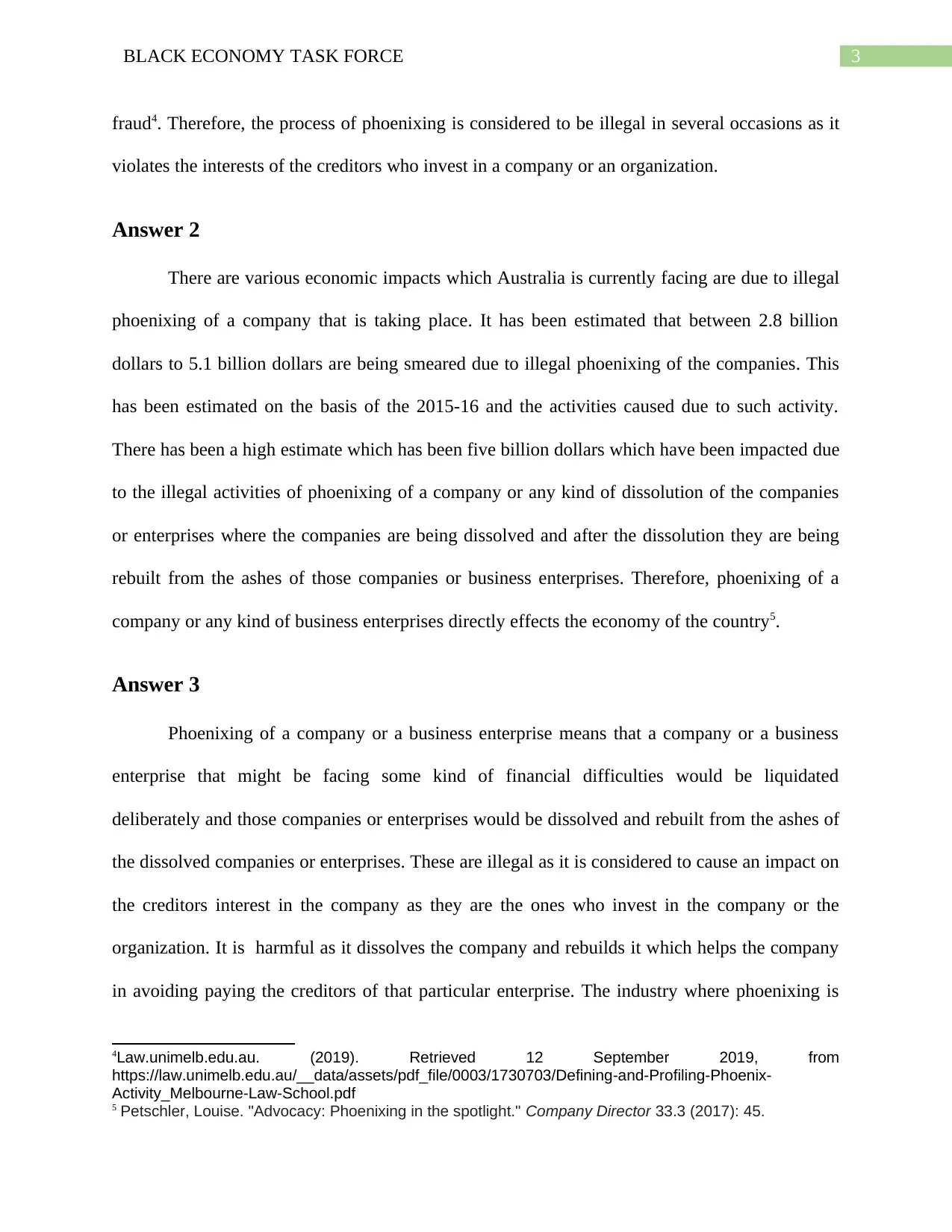
3BLACK ECONOMY TASK FORCE
fraud4. Therefore, the process of phoenixing is considered to be illegal in several occasions as it
violates the interests of the creditors who invest in a company or an organization.
Answer 2
There are various economic impacts which Australia is currently facing are due to illegal
phoenixing of a company that is taking place. It has been estimated that between 2.8 billion
dollars to 5.1 billion dollars are being smeared due to illegal phoenixing of the companies. This
has been estimated on the basis of the 2015-16 and the activities caused due to such activity.
There has been a high estimate which has been five billion dollars which have been impacted due
to the illegal activities of phoenixing of a company or any kind of dissolution of the companies
or enterprises where the companies are being dissolved and after the dissolution they are being
rebuilt from the ashes of those companies or business enterprises. Therefore, phoenixing of a
company or any kind of business enterprises directly effects the economy of the country5.
Answer 3
Phoenixing of a company or a business enterprise means that a company or a business
enterprise that might be facing some kind of financial difficulties would be liquidated
deliberately and those companies or enterprises would be dissolved and rebuilt from the ashes of
the dissolved companies or enterprises. These are illegal as it is considered to cause an impact on
the creditors interest in the company as they are the ones who invest in the company or the
organization. It is harmful as it dissolves the company and rebuilds it which helps the company
in avoiding paying the creditors of that particular enterprise. The industry where phoenixing is
4Law.unimelb.edu.au. (2019). Retrieved 12 September 2019, from
https://law.unimelb.edu.au/__data/assets/pdf_file/0003/1730703/Defining-and-Profiling-Phoenix-
Activity_Melbourne-Law-School.pdf
5 Petschler, Louise. "Advocacy: Phoenixing in the spotlight." Company Director 33.3 (2017): 45.
fraud4. Therefore, the process of phoenixing is considered to be illegal in several occasions as it
violates the interests of the creditors who invest in a company or an organization.
Answer 2
There are various economic impacts which Australia is currently facing are due to illegal
phoenixing of a company that is taking place. It has been estimated that between 2.8 billion
dollars to 5.1 billion dollars are being smeared due to illegal phoenixing of the companies. This
has been estimated on the basis of the 2015-16 and the activities caused due to such activity.
There has been a high estimate which has been five billion dollars which have been impacted due
to the illegal activities of phoenixing of a company or any kind of dissolution of the companies
or enterprises where the companies are being dissolved and after the dissolution they are being
rebuilt from the ashes of those companies or business enterprises. Therefore, phoenixing of a
company or any kind of business enterprises directly effects the economy of the country5.
Answer 3
Phoenixing of a company or a business enterprise means that a company or a business
enterprise that might be facing some kind of financial difficulties would be liquidated
deliberately and those companies or enterprises would be dissolved and rebuilt from the ashes of
the dissolved companies or enterprises. These are illegal as it is considered to cause an impact on
the creditors interest in the company as they are the ones who invest in the company or the
organization. It is harmful as it dissolves the company and rebuilds it which helps the company
in avoiding paying the creditors of that particular enterprise. The industry where phoenixing is
4Law.unimelb.edu.au. (2019). Retrieved 12 September 2019, from
https://law.unimelb.edu.au/__data/assets/pdf_file/0003/1730703/Defining-and-Profiling-Phoenix-
Activity_Melbourne-Law-School.pdf
5 Petschler, Louise. "Advocacy: Phoenixing in the spotlight." Company Director 33.3 (2017): 45.
Paraphrase This Document
Need a fresh take? Get an instant paraphrase of this document with our AI Paraphraser
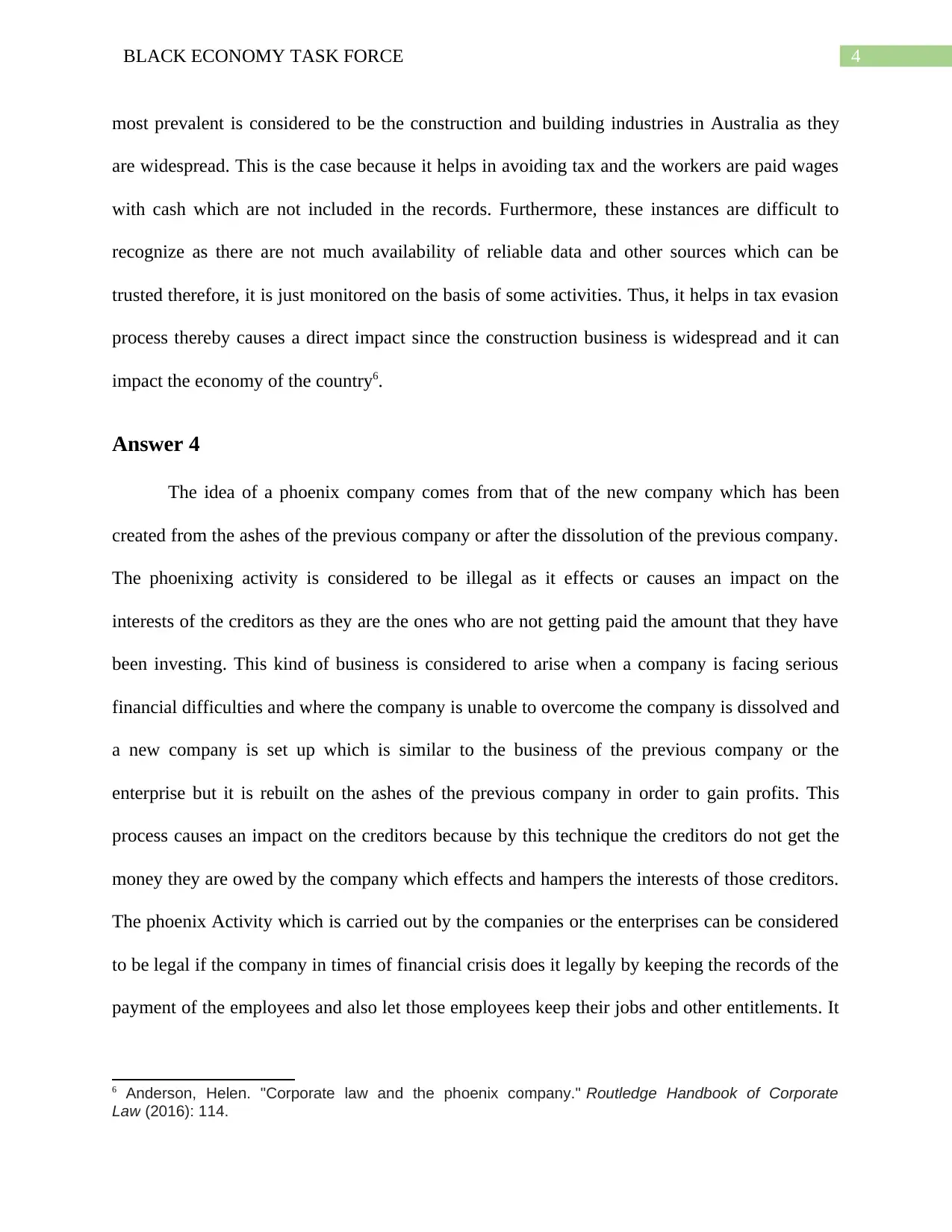
4BLACK ECONOMY TASK FORCE
most prevalent is considered to be the construction and building industries in Australia as they
are widespread. This is the case because it helps in avoiding tax and the workers are paid wages
with cash which are not included in the records. Furthermore, these instances are difficult to
recognize as there are not much availability of reliable data and other sources which can be
trusted therefore, it is just monitored on the basis of some activities. Thus, it helps in tax evasion
process thereby causes a direct impact since the construction business is widespread and it can
impact the economy of the country6.
Answer 4
The idea of a phoenix company comes from that of the new company which has been
created from the ashes of the previous company or after the dissolution of the previous company.
The phoenixing activity is considered to be illegal as it effects or causes an impact on the
interests of the creditors as they are the ones who are not getting paid the amount that they have
been investing. This kind of business is considered to arise when a company is facing serious
financial difficulties and where the company is unable to overcome the company is dissolved and
a new company is set up which is similar to the business of the previous company or the
enterprise but it is rebuilt on the ashes of the previous company in order to gain profits. This
process causes an impact on the creditors because by this technique the creditors do not get the
money they are owed by the company which effects and hampers the interests of those creditors.
The phoenix Activity which is carried out by the companies or the enterprises can be considered
to be legal if the company in times of financial crisis does it legally by keeping the records of the
payment of the employees and also let those employees keep their jobs and other entitlements. It
6 Anderson, Helen. "Corporate law and the phoenix company." Routledge Handbook of Corporate
Law (2016): 114.
most prevalent is considered to be the construction and building industries in Australia as they
are widespread. This is the case because it helps in avoiding tax and the workers are paid wages
with cash which are not included in the records. Furthermore, these instances are difficult to
recognize as there are not much availability of reliable data and other sources which can be
trusted therefore, it is just monitored on the basis of some activities. Thus, it helps in tax evasion
process thereby causes a direct impact since the construction business is widespread and it can
impact the economy of the country6.
Answer 4
The idea of a phoenix company comes from that of the new company which has been
created from the ashes of the previous company or after the dissolution of the previous company.
The phoenixing activity is considered to be illegal as it effects or causes an impact on the
interests of the creditors as they are the ones who are not getting paid the amount that they have
been investing. This kind of business is considered to arise when a company is facing serious
financial difficulties and where the company is unable to overcome the company is dissolved and
a new company is set up which is similar to the business of the previous company or the
enterprise but it is rebuilt on the ashes of the previous company in order to gain profits. This
process causes an impact on the creditors because by this technique the creditors do not get the
money they are owed by the company which effects and hampers the interests of those creditors.
The phoenix Activity which is carried out by the companies or the enterprises can be considered
to be legal if the company in times of financial crisis does it legally by keeping the records of the
payment of the employees and also let those employees keep their jobs and other entitlements. It
6 Anderson, Helen. "Corporate law and the phoenix company." Routledge Handbook of Corporate
Law (2016): 114.
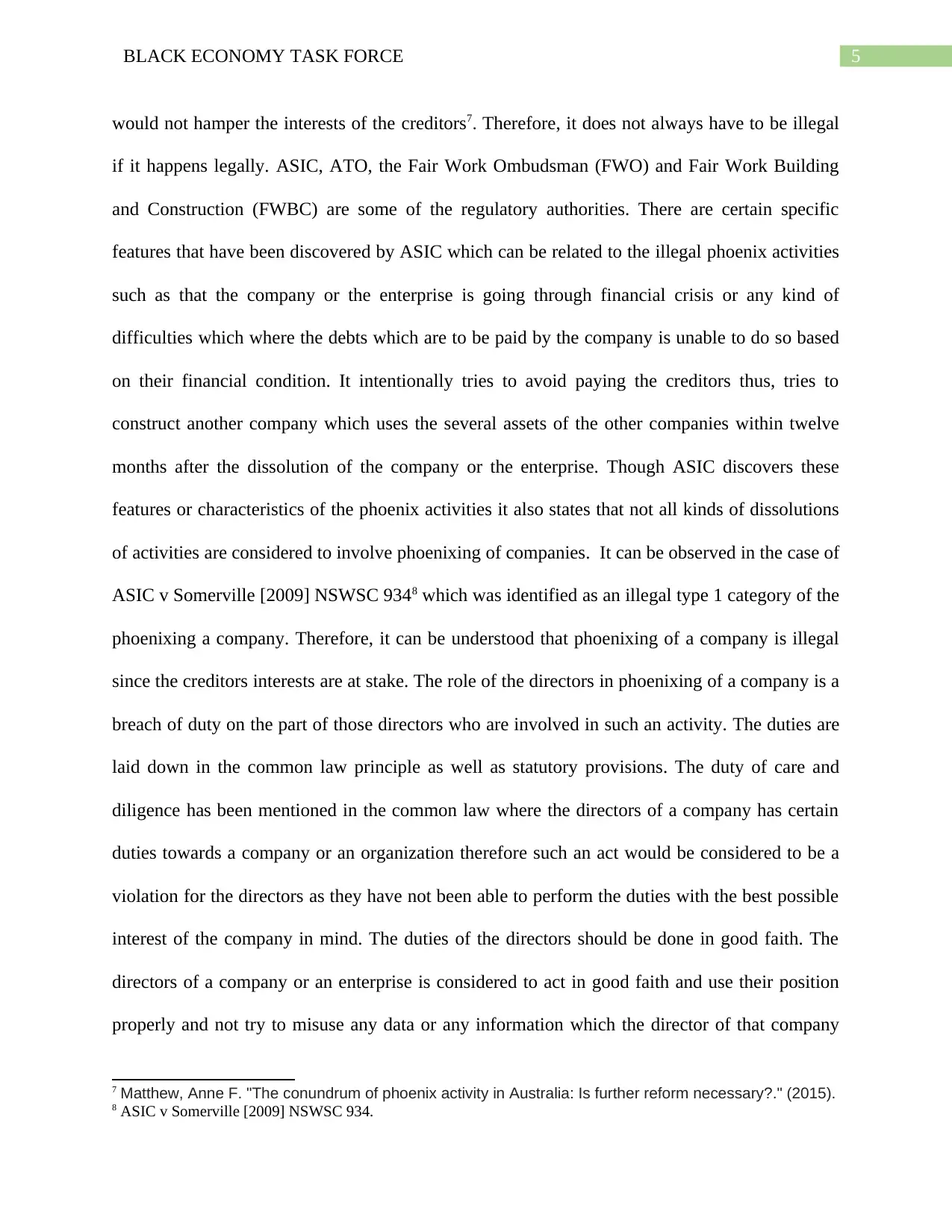
5BLACK ECONOMY TASK FORCE
would not hamper the interests of the creditors7. Therefore, it does not always have to be illegal
if it happens legally. ASIC, ATO, the Fair Work Ombudsman (FWO) and Fair Work Building
and Construction (FWBC) are some of the regulatory authorities. There are certain specific
features that have been discovered by ASIC which can be related to the illegal phoenix activities
such as that the company or the enterprise is going through financial crisis or any kind of
difficulties which where the debts which are to be paid by the company is unable to do so based
on their financial condition. It intentionally tries to avoid paying the creditors thus, tries to
construct another company which uses the several assets of the other companies within twelve
months after the dissolution of the company or the enterprise. Though ASIC discovers these
features or characteristics of the phoenix activities it also states that not all kinds of dissolutions
of activities are considered to involve phoenixing of companies. It can be observed in the case of
ASIC v Somerville [2009] NSWSC 9348 which was identified as an illegal type 1 category of the
phoenixing a company. Therefore, it can be understood that phoenixing of a company is illegal
since the creditors interests are at stake. The role of the directors in phoenixing of a company is a
breach of duty on the part of those directors who are involved in such an activity. The duties are
laid down in the common law principle as well as statutory provisions. The duty of care and
diligence has been mentioned in the common law where the directors of a company has certain
duties towards a company or an organization therefore such an act would be considered to be a
violation for the directors as they have not been able to perform the duties with the best possible
interest of the company in mind. The duties of the directors should be done in good faith. The
directors of a company or an enterprise is considered to act in good faith and use their position
properly and not try to misuse any data or any information which the director of that company
7 Matthew, Anne F. "The conundrum of phoenix activity in Australia: Is further reform necessary?." (2015).
8 ASIC v Somerville [2009] NSWSC 934.
would not hamper the interests of the creditors7. Therefore, it does not always have to be illegal
if it happens legally. ASIC, ATO, the Fair Work Ombudsman (FWO) and Fair Work Building
and Construction (FWBC) are some of the regulatory authorities. There are certain specific
features that have been discovered by ASIC which can be related to the illegal phoenix activities
such as that the company or the enterprise is going through financial crisis or any kind of
difficulties which where the debts which are to be paid by the company is unable to do so based
on their financial condition. It intentionally tries to avoid paying the creditors thus, tries to
construct another company which uses the several assets of the other companies within twelve
months after the dissolution of the company or the enterprise. Though ASIC discovers these
features or characteristics of the phoenix activities it also states that not all kinds of dissolutions
of activities are considered to involve phoenixing of companies. It can be observed in the case of
ASIC v Somerville [2009] NSWSC 9348 which was identified as an illegal type 1 category of the
phoenixing a company. Therefore, it can be understood that phoenixing of a company is illegal
since the creditors interests are at stake. The role of the directors in phoenixing of a company is a
breach of duty on the part of those directors who are involved in such an activity. The duties are
laid down in the common law principle as well as statutory provisions. The duty of care and
diligence has been mentioned in the common law where the directors of a company has certain
duties towards a company or an organization therefore such an act would be considered to be a
violation for the directors as they have not been able to perform the duties with the best possible
interest of the company in mind. The duties of the directors should be done in good faith. The
directors of a company or an enterprise is considered to act in good faith and use their position
properly and not try to misuse any data or any information which the director of that company
7 Matthew, Anne F. "The conundrum of phoenix activity in Australia: Is further reform necessary?." (2015).
8 ASIC v Somerville [2009] NSWSC 934.
⊘ This is a preview!⊘
Do you want full access?
Subscribe today to unlock all pages.

Trusted by 1+ million students worldwide
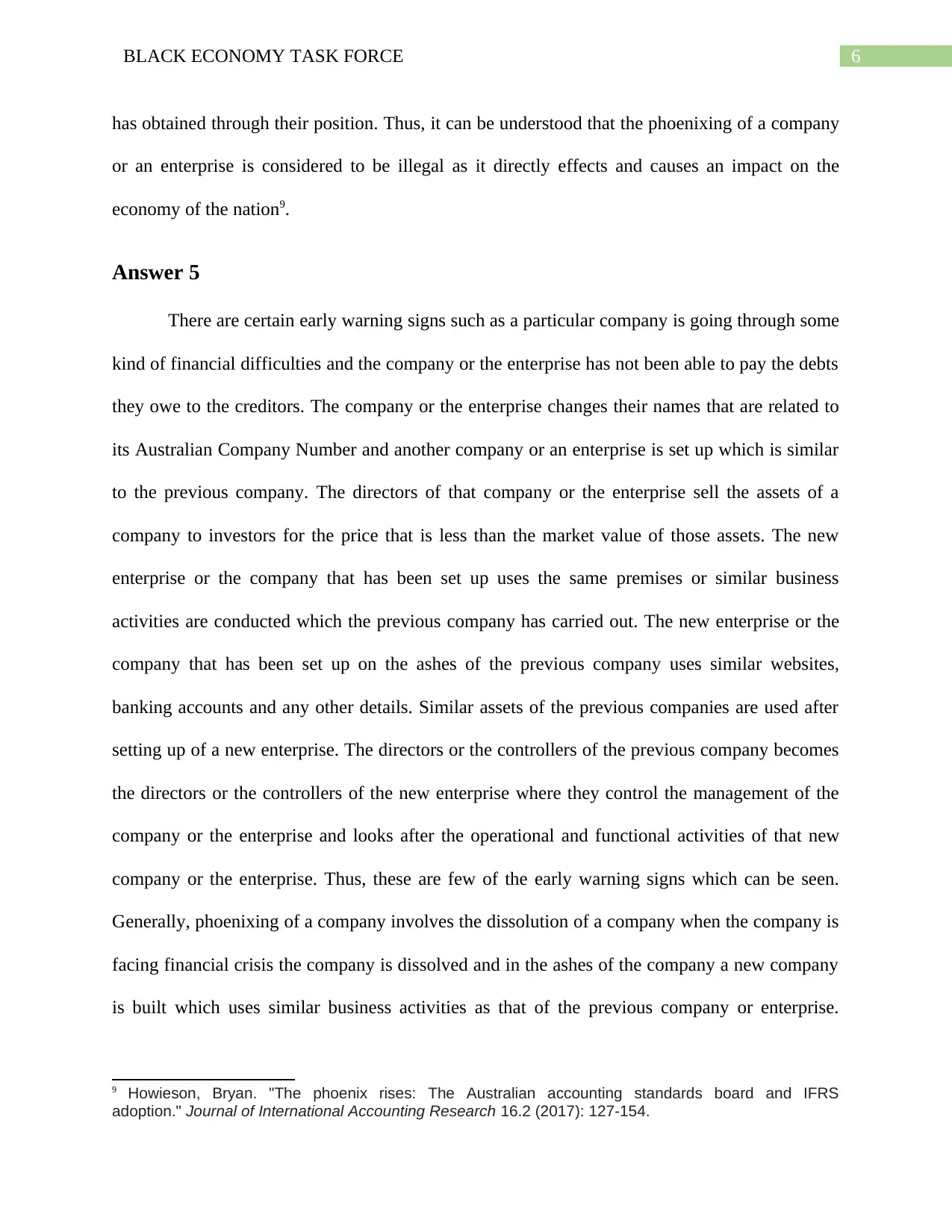
6BLACK ECONOMY TASK FORCE
has obtained through their position. Thus, it can be understood that the phoenixing of a company
or an enterprise is considered to be illegal as it directly effects and causes an impact on the
economy of the nation9.
Answer 5
There are certain early warning signs such as a particular company is going through some
kind of financial difficulties and the company or the enterprise has not been able to pay the debts
they owe to the creditors. The company or the enterprise changes their names that are related to
its Australian Company Number and another company or an enterprise is set up which is similar
to the previous company. The directors of that company or the enterprise sell the assets of a
company to investors for the price that is less than the market value of those assets. The new
enterprise or the company that has been set up uses the same premises or similar business
activities are conducted which the previous company has carried out. The new enterprise or the
company that has been set up on the ashes of the previous company uses similar websites,
banking accounts and any other details. Similar assets of the previous companies are used after
setting up of a new enterprise. The directors or the controllers of the previous company becomes
the directors or the controllers of the new enterprise where they control the management of the
company or the enterprise and looks after the operational and functional activities of that new
company or the enterprise. Thus, these are few of the early warning signs which can be seen.
Generally, phoenixing of a company involves the dissolution of a company when the company is
facing financial crisis the company is dissolved and in the ashes of the company a new company
is built which uses similar business activities as that of the previous company or enterprise.
9 Howieson, Bryan. "The phoenix rises: The Australian accounting standards board and IFRS
adoption." Journal of International Accounting Research 16.2 (2017): 127-154.
has obtained through their position. Thus, it can be understood that the phoenixing of a company
or an enterprise is considered to be illegal as it directly effects and causes an impact on the
economy of the nation9.
Answer 5
There are certain early warning signs such as a particular company is going through some
kind of financial difficulties and the company or the enterprise has not been able to pay the debts
they owe to the creditors. The company or the enterprise changes their names that are related to
its Australian Company Number and another company or an enterprise is set up which is similar
to the previous company. The directors of that company or the enterprise sell the assets of a
company to investors for the price that is less than the market value of those assets. The new
enterprise or the company that has been set up uses the same premises or similar business
activities are conducted which the previous company has carried out. The new enterprise or the
company that has been set up on the ashes of the previous company uses similar websites,
banking accounts and any other details. Similar assets of the previous companies are used after
setting up of a new enterprise. The directors or the controllers of the previous company becomes
the directors or the controllers of the new enterprise where they control the management of the
company or the enterprise and looks after the operational and functional activities of that new
company or the enterprise. Thus, these are few of the early warning signs which can be seen.
Generally, phoenixing of a company involves the dissolution of a company when the company is
facing financial crisis the company is dissolved and in the ashes of the company a new company
is built which uses similar business activities as that of the previous company or enterprise.
9 Howieson, Bryan. "The phoenix rises: The Australian accounting standards board and IFRS
adoption." Journal of International Accounting Research 16.2 (2017): 127-154.
Paraphrase This Document
Need a fresh take? Get an instant paraphrase of this document with our AI Paraphraser
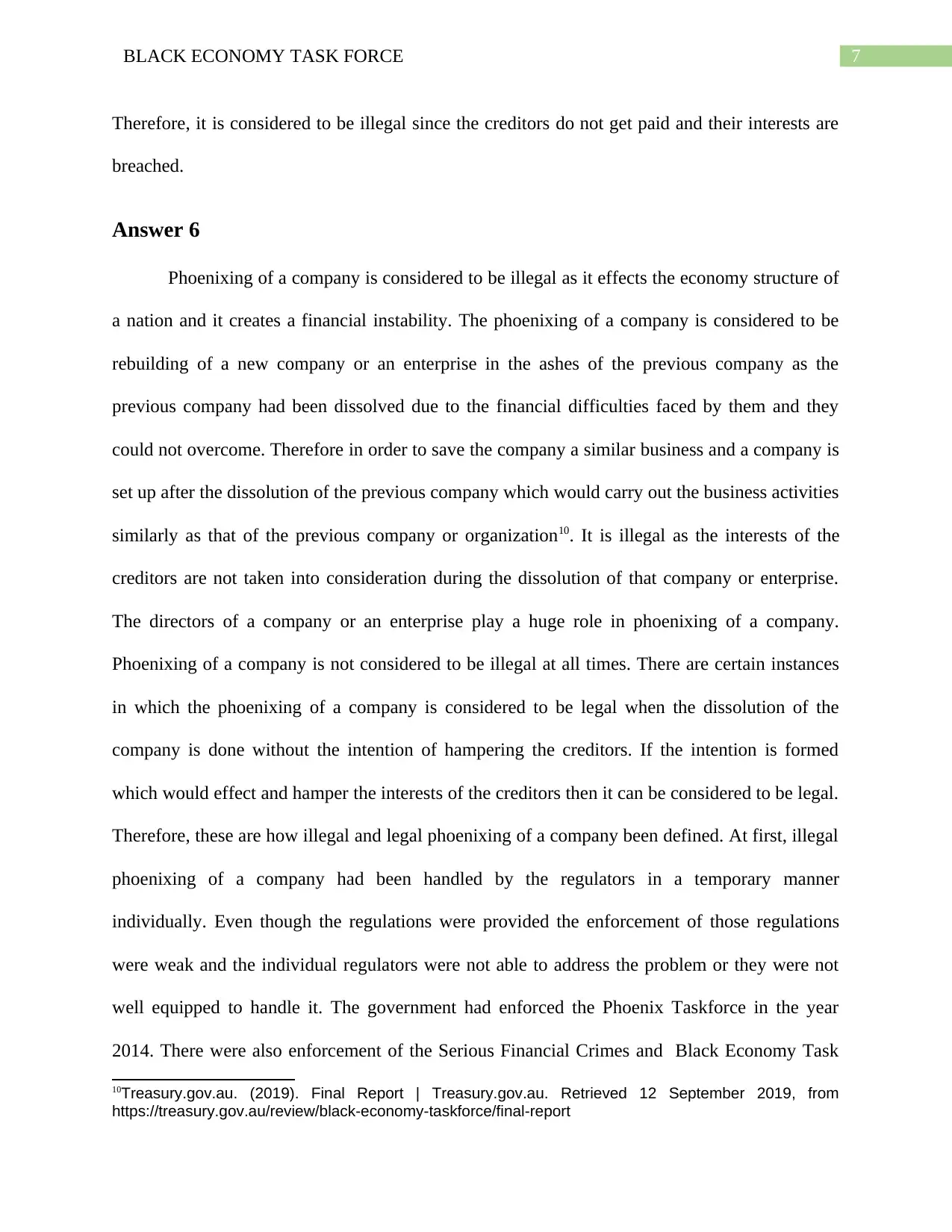
7BLACK ECONOMY TASK FORCE
Therefore, it is considered to be illegal since the creditors do not get paid and their interests are
breached.
Answer 6
Phoenixing of a company is considered to be illegal as it effects the economy structure of
a nation and it creates a financial instability. The phoenixing of a company is considered to be
rebuilding of a new company or an enterprise in the ashes of the previous company as the
previous company had been dissolved due to the financial difficulties faced by them and they
could not overcome. Therefore in order to save the company a similar business and a company is
set up after the dissolution of the previous company which would carry out the business activities
similarly as that of the previous company or organization10. It is illegal as the interests of the
creditors are not taken into consideration during the dissolution of that company or enterprise.
The directors of a company or an enterprise play a huge role in phoenixing of a company.
Phoenixing of a company is not considered to be illegal at all times. There are certain instances
in which the phoenixing of a company is considered to be legal when the dissolution of the
company is done without the intention of hampering the creditors. If the intention is formed
which would effect and hamper the interests of the creditors then it can be considered to be legal.
Therefore, these are how illegal and legal phoenixing of a company been defined. At first, illegal
phoenixing of a company had been handled by the regulators in a temporary manner
individually. Even though the regulations were provided the enforcement of those regulations
were weak and the individual regulators were not able to address the problem or they were not
well equipped to handle it. The government had enforced the Phoenix Taskforce in the year
2014. There were also enforcement of the Serious Financial Crimes and Black Economy Task
10Treasury.gov.au. (2019). Final Report | Treasury.gov.au. Retrieved 12 September 2019, from
https://treasury.gov.au/review/black-economy-taskforce/final-report
Therefore, it is considered to be illegal since the creditors do not get paid and their interests are
breached.
Answer 6
Phoenixing of a company is considered to be illegal as it effects the economy structure of
a nation and it creates a financial instability. The phoenixing of a company is considered to be
rebuilding of a new company or an enterprise in the ashes of the previous company as the
previous company had been dissolved due to the financial difficulties faced by them and they
could not overcome. Therefore in order to save the company a similar business and a company is
set up after the dissolution of the previous company which would carry out the business activities
similarly as that of the previous company or organization10. It is illegal as the interests of the
creditors are not taken into consideration during the dissolution of that company or enterprise.
The directors of a company or an enterprise play a huge role in phoenixing of a company.
Phoenixing of a company is not considered to be illegal at all times. There are certain instances
in which the phoenixing of a company is considered to be legal when the dissolution of the
company is done without the intention of hampering the creditors. If the intention is formed
which would effect and hamper the interests of the creditors then it can be considered to be legal.
Therefore, these are how illegal and legal phoenixing of a company been defined. At first, illegal
phoenixing of a company had been handled by the regulators in a temporary manner
individually. Even though the regulations were provided the enforcement of those regulations
were weak and the individual regulators were not able to address the problem or they were not
well equipped to handle it. The government had enforced the Phoenix Taskforce in the year
2014. There were also enforcement of the Serious Financial Crimes and Black Economy Task
10Treasury.gov.au. (2019). Final Report | Treasury.gov.au. Retrieved 12 September 2019, from
https://treasury.gov.au/review/black-economy-taskforce/final-report
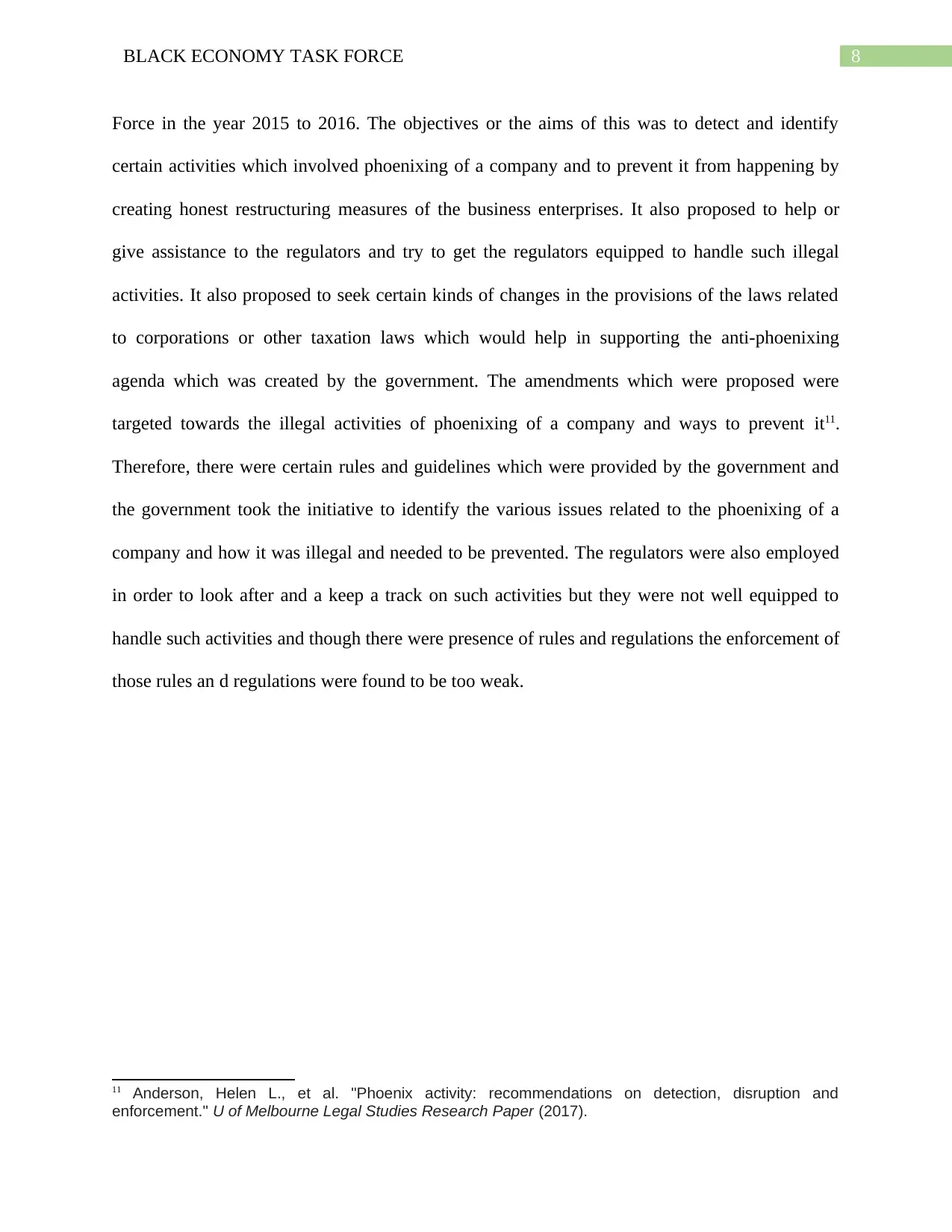
8BLACK ECONOMY TASK FORCE
Force in the year 2015 to 2016. The objectives or the aims of this was to detect and identify
certain activities which involved phoenixing of a company and to prevent it from happening by
creating honest restructuring measures of the business enterprises. It also proposed to help or
give assistance to the regulators and try to get the regulators equipped to handle such illegal
activities. It also proposed to seek certain kinds of changes in the provisions of the laws related
to corporations or other taxation laws which would help in supporting the anti-phoenixing
agenda which was created by the government. The amendments which were proposed were
targeted towards the illegal activities of phoenixing of a company and ways to prevent it11.
Therefore, there were certain rules and guidelines which were provided by the government and
the government took the initiative to identify the various issues related to the phoenixing of a
company and how it was illegal and needed to be prevented. The regulators were also employed
in order to look after and a keep a track on such activities but they were not well equipped to
handle such activities and though there were presence of rules and regulations the enforcement of
those rules an d regulations were found to be too weak.
11 Anderson, Helen L., et al. "Phoenix activity: recommendations on detection, disruption and
enforcement." U of Melbourne Legal Studies Research Paper (2017).
Force in the year 2015 to 2016. The objectives or the aims of this was to detect and identify
certain activities which involved phoenixing of a company and to prevent it from happening by
creating honest restructuring measures of the business enterprises. It also proposed to help or
give assistance to the regulators and try to get the regulators equipped to handle such illegal
activities. It also proposed to seek certain kinds of changes in the provisions of the laws related
to corporations or other taxation laws which would help in supporting the anti-phoenixing
agenda which was created by the government. The amendments which were proposed were
targeted towards the illegal activities of phoenixing of a company and ways to prevent it11.
Therefore, there were certain rules and guidelines which were provided by the government and
the government took the initiative to identify the various issues related to the phoenixing of a
company and how it was illegal and needed to be prevented. The regulators were also employed
in order to look after and a keep a track on such activities but they were not well equipped to
handle such activities and though there were presence of rules and regulations the enforcement of
those rules an d regulations were found to be too weak.
11 Anderson, Helen L., et al. "Phoenix activity: recommendations on detection, disruption and
enforcement." U of Melbourne Legal Studies Research Paper (2017).
⊘ This is a preview!⊘
Do you want full access?
Subscribe today to unlock all pages.

Trusted by 1+ million students worldwide
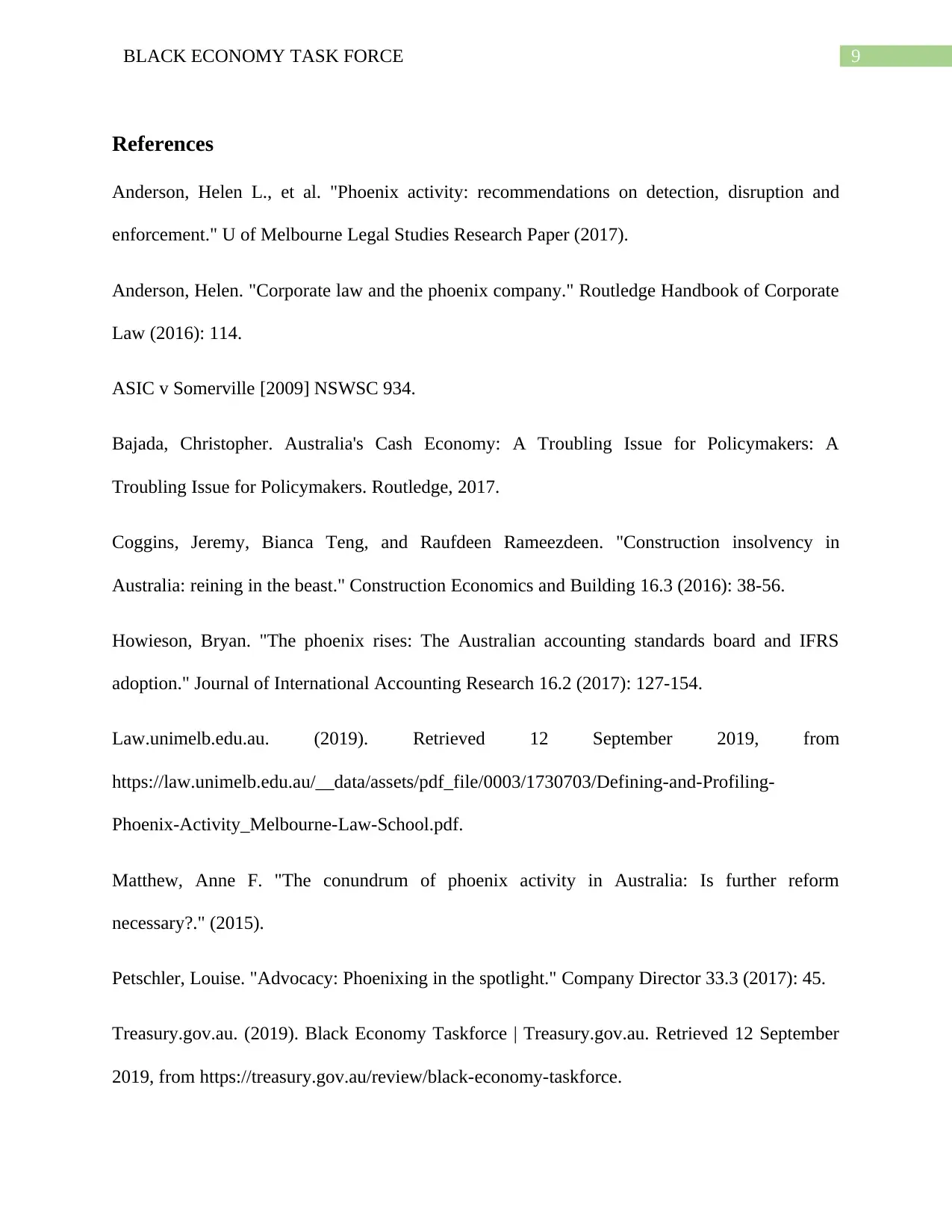
9BLACK ECONOMY TASK FORCE
References
Anderson, Helen L., et al. "Phoenix activity: recommendations on detection, disruption and
enforcement." U of Melbourne Legal Studies Research Paper (2017).
Anderson, Helen. "Corporate law and the phoenix company." Routledge Handbook of Corporate
Law (2016): 114.
ASIC v Somerville [2009] NSWSC 934.
Bajada, Christopher. Australia's Cash Economy: A Troubling Issue for Policymakers: A
Troubling Issue for Policymakers. Routledge, 2017.
Coggins, Jeremy, Bianca Teng, and Raufdeen Rameezdeen. "Construction insolvency in
Australia: reining in the beast." Construction Economics and Building 16.3 (2016): 38-56.
Howieson, Bryan. "The phoenix rises: The Australian accounting standards board and IFRS
adoption." Journal of International Accounting Research 16.2 (2017): 127-154.
Law.unimelb.edu.au. (2019). Retrieved 12 September 2019, from
https://law.unimelb.edu.au/__data/assets/pdf_file/0003/1730703/Defining-and-Profiling-
Phoenix-Activity_Melbourne-Law-School.pdf.
Matthew, Anne F. "The conundrum of phoenix activity in Australia: Is further reform
necessary?." (2015).
Petschler, Louise. "Advocacy: Phoenixing in the spotlight." Company Director 33.3 (2017): 45.
Treasury.gov.au. (2019). Black Economy Taskforce | Treasury.gov.au. Retrieved 12 September
2019, from https://treasury.gov.au/review/black-economy-taskforce.
References
Anderson, Helen L., et al. "Phoenix activity: recommendations on detection, disruption and
enforcement." U of Melbourne Legal Studies Research Paper (2017).
Anderson, Helen. "Corporate law and the phoenix company." Routledge Handbook of Corporate
Law (2016): 114.
ASIC v Somerville [2009] NSWSC 934.
Bajada, Christopher. Australia's Cash Economy: A Troubling Issue for Policymakers: A
Troubling Issue for Policymakers. Routledge, 2017.
Coggins, Jeremy, Bianca Teng, and Raufdeen Rameezdeen. "Construction insolvency in
Australia: reining in the beast." Construction Economics and Building 16.3 (2016): 38-56.
Howieson, Bryan. "The phoenix rises: The Australian accounting standards board and IFRS
adoption." Journal of International Accounting Research 16.2 (2017): 127-154.
Law.unimelb.edu.au. (2019). Retrieved 12 September 2019, from
https://law.unimelb.edu.au/__data/assets/pdf_file/0003/1730703/Defining-and-Profiling-
Phoenix-Activity_Melbourne-Law-School.pdf.
Matthew, Anne F. "The conundrum of phoenix activity in Australia: Is further reform
necessary?." (2015).
Petschler, Louise. "Advocacy: Phoenixing in the spotlight." Company Director 33.3 (2017): 45.
Treasury.gov.au. (2019). Black Economy Taskforce | Treasury.gov.au. Retrieved 12 September
2019, from https://treasury.gov.au/review/black-economy-taskforce.
Paraphrase This Document
Need a fresh take? Get an instant paraphrase of this document with our AI Paraphraser
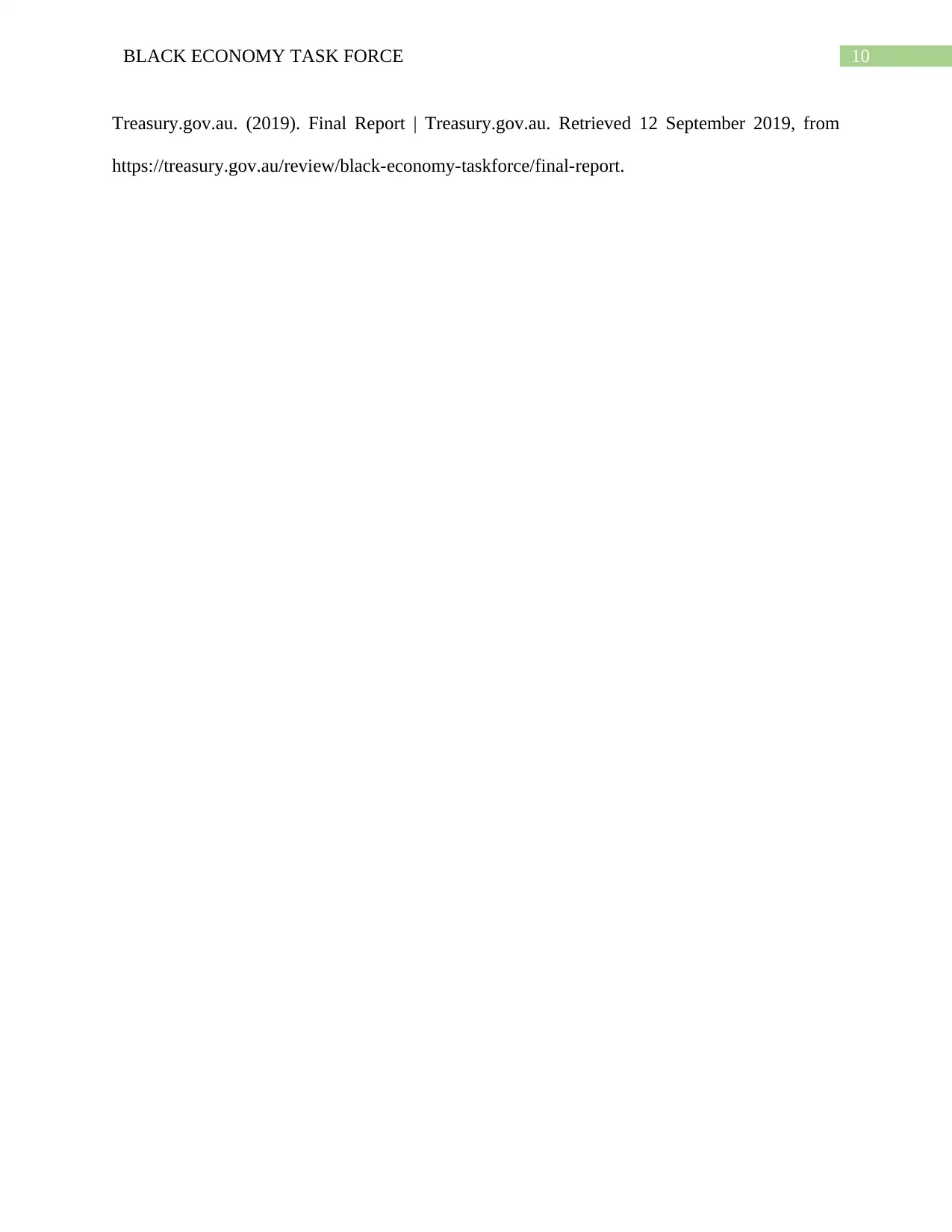
10BLACK ECONOMY TASK FORCE
Treasury.gov.au. (2019). Final Report | Treasury.gov.au. Retrieved 12 September 2019, from
https://treasury.gov.au/review/black-economy-taskforce/final-report.
Treasury.gov.au. (2019). Final Report | Treasury.gov.au. Retrieved 12 September 2019, from
https://treasury.gov.au/review/black-economy-taskforce/final-report.
1 out of 11
Related Documents
Your All-in-One AI-Powered Toolkit for Academic Success.
+13062052269
info@desklib.com
Available 24*7 on WhatsApp / Email
![[object Object]](/_next/static/media/star-bottom.7253800d.svg)
Unlock your academic potential
Copyright © 2020–2025 A2Z Services. All Rights Reserved. Developed and managed by ZUCOL.





